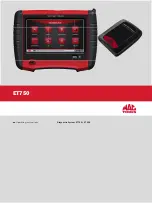
Form 801661B
Page Number - 9
8 . Keep the bleed screw open and continue to op-
erate the vacuum pump as required until new
fluid is visibly flowing through the bleed tube .
9 . Without over-tightening, close the bleed
screw firmly prior to removing the bleed screw
adapter or hose from the bleed screw, or reliev-
ing the vacuum from the system .
NOTE: It is important to ensure the bleed screw
adapter remains connected to the bleed screw,
and the bleeder is still pulling a vacuum while
the bleed screw is closed . This prevents air
from being sucked back into the wheel cylinder
from around the bleed screw threads, before
the bleed screw is tightened and sealed .
NOTE: If an automatic master cylinder refill
accessory is not being used, be sure to periodi-
cally check the level and top off the brake fluid
in the master cylinder so it does not run dry .
Topping-off Sealed Automatic
Transmissions
The Fluid Transfer Accessory Kit is appropriate for
use to refill or top-off sealed automatic transmis-
sions . Additional accessories and adapters may be
required and available from Mityvac for performing
this function .
1 . Unscrew the cap from the fluid transfer bottle,
and fill to desired level with the vehicle manu-
facturer’s recommended transmission fluid .
CAUTION: Lifetime “sealed” transmissions
require the use of special manufacturer recom-
mended fluids . Use of any other fluids may
cause severe damage to the transmission and
void the manufacturer’s warranty
2 . Reinstall the cap onto the bottle and hang the
assembly in a safe, secure location within reach
of the transmission fill port .
3 . Close the ball the valve located on the fluid
hose assembly extending from the bottom of
the bottle .
4 . Connect a Mityvac hand pressure pump w/
pressure gauge to the inlet hose extending
from the side of the fluid transfer bottle .
5 . Depending on the application, select the appro-
priate ATF refill adapter and perform one of the
following series of steps:
Connect the ATF refill adapter to the trans-
mission fill port; then connect the fluid hose
extending from the bottom of the fluid transfer
bottle to the other end of the adapter .
-or-
Connect the ATF refill adapter to the fluid hose
extending from the bottom of the fluid transfer
bottle; then insert the adapter into transmission
fill port .
6 . Open the shut-off valve, and while observing
the pressure gauge, operate the pump to build
pressure in the reservoir to the desired level, or
until the proper amount of fluid has been dis-
pensed . Do not exceed 20 psi (1 .4 bar) pressure
in the system .
NOTE: Check the vehicle’s service manual to
determine the proper method to check the
transmission fluid level . Failure to follow the
manufacturer’s recommended procedure could
result in under- or over-filling the transmission,
causing severe transmission damage .
It is not necessary to relieve the pressure in the
fluid transfer bottle or close the shut-off valve
if the hose must be disconnected from the
adapter to check the transmission fluid level .
An automatic shut-off valve is built into the
quick-change coupler, which will prevent the
discharge of fluid if the coupler is disconnected
from the adapter .
Continual operation of the pump is not required
to maintain fluid flow . Fluid will continue to
flow as long as there is pressure in the reservoir,
the hose is connected to the adapter, and the
shutoff valve is open .
If the transmission is over-filled, you may
reverse the hand pump to pull a vacuum on the
system to remove and capture the excess fluid .
7 . Once the proper amount of fluid has been
dispensed, close the shutoff valve and release
the pressure in the system by activating the
pressure relief lever on the hand pump .
8 . Depending on the type of fluid and future
intended use, you may store the remaining fluid
from the reservoir . Otherwise, empty the fluid
transfer bottle, clean it with denatured alcohol
or a common household cleaner, and store it
properly .










































